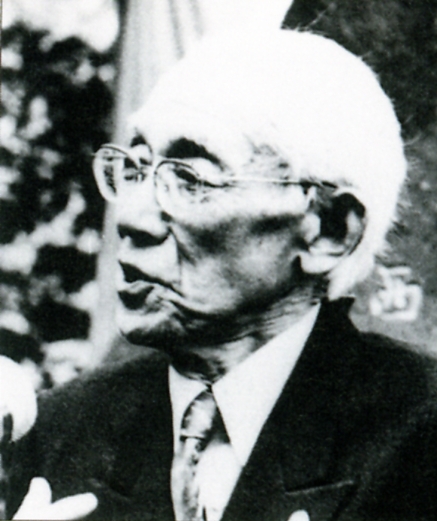- Nishiwaki Junzaburo
Infobox Writer
name = Nishiwaki Junzaburō

caption = Nishiwaki Junzaburō
birthdate = birth date|1894|1|20|df=y
birthplace =Ojiya, Niigata Japan
deathdate = death date and age|1982|6|5|1894|1|20|df=y
deathplace =Ojiya, Niigata ,Japan
occupation = Writer, Translator, Literary Critic
genre = poetry
movement =modernism ,surrealism
notableworks =
influences =
influenced = nihongo|Junzaburō Nishiwaki|西脇順三郎|Nishiwaki Junzaburō|extra=20 January 1894 –5 June 1982 was a contemporaryJapanese poet andliterary critic , active inShōwa period Japan .Early life
Nishiwaki was born in
Ojiya inNiigata prefecture , where his father was a banker. He came toTokyo intending to become a painter and studied under the famousFujishima Takeji andKuroda Seiki but had to give up an artistic career due to his father’s sudden death. Instead, he enrolled inKeio University 's Department of Economics, and also studiedLatin , English, Greek, and German. Even as a student he demonstrated extraordinary language abilities, writing his thesis entirely in Latin.Literary career
Nishiwaki became interested in poetry while a student at Keio University, and contributed verses to the boy's magazine "Shonen Sekai". He also began to write poetry in English. Nishiwaki expressed distaste for the
romanticism and subjective modes which dominated modern Japanese poetry.He accepted a teaching post at Keiō University in 1920, while continuing to contribute English verses to various journals, and editing poetry magazines on the side.
After graduation, he was hired by the
Japan Times newspaper, but was forced to resign due to poor health. Soon afterwards, in 1922, Nishiwaki went to study atOxford University inGreat Britain where he spent the next three years. While at Oxford, he was introduced tomodernist literature and the works ofJames Joyce ,Ezra Pound , andT. S. Eliot . He was also fascinated byCharles Baudelaire and developments in the Frenchsurrealism , and even attempted to compose some works in French. His first volume of poetry, "Spectrum" (1925), was written in English and published inLondon at his own expense.Returning to Japan, Nishiwaki accepted a position as a professor at Keiō University and taught the history of
English Literature as well as a range of courses inlinguistics . However, he kept writing on the side, and was especially inspired by the poetry ofHagiwara Sakutarō , who was lauded by critics as one of the great poets of theTaishō period . Nishiwaki experimented with new techniques, and began writing poetry in Japanese for the first time. In 1927, he published Japan's first surrealist poetry magazine, "Fukuiku Taru Kafu Yo". The next year, along with collaborators such asAnzai Fuyue , he brought out another new magazine "Shi to Shiron" ("Poetry and Poetic Theory") and became a leader of the new contemporary poetry movement. In 1933, he published "Ambarvalia", a collection which gathered together the previous experiments and efforts in writing poetry in Japanese; however, Nishiwaki suddenly stopped publishing two years later.Later literary career
Nishiwaki lived in Kamakura,
Kanagawa prefecture during thePacific War years of 1942-1944. After the war, he revealed another major collection titled "Tabibito kaerazu" ("No Traveler Returns"). Nishiwaki also devoted effort to translation, publishing a Japanese version of T. S. Eliot's "The Waste Land ," which was received with great critical acclaim. He followed this with yet another collection of his own verse in 1953, titled "Kindai no gūwa" ("Modern Fables").While writing poetry and translations, Nishiwaki continued teaching at Keiō University until his retirement in 1962.
In 1962, Nishiwaki was appointed to the
Japan Art Academy , and in 1974 was made a member of theAmerican Academy of Arts and Sciences . He was also nominated for theNobel Prize in Literature .Nishiwaki died of heart failure at the age of 88 at his hometown in Niigata. His grave is at the temple of
Zōjō-ji inShiba, Tokyo .References
* Hirata, Hosea. "The Poetry and Poetics of Nishiwaki Junzaburo:Modernism in Translation". Princeton University Press (1993). ISBN 0691069816
* Nishiwaki, Junzaburo. "Gen'Ei: Selected Poems of Nishiwaki Junzaburo, 1894-1982". Wild Peony (1991). ISBN 0959073582ee also
*
Japanese literature
*List of Japanese authors External links
* [http://www.city.ojiya.niigata.jp/kikaku/english/e_kanko/e_mustsee/mus01.html Junzaburo Nishiwaki's Memorial Room] in Ojiya, Niigata.
* [http://www.city.kamakura.kanagawa.jp/bunka/bunjinroku/nishiwaki_e.htm Literary Figures of Kamakura]
Wikimedia Foundation. 2010.
